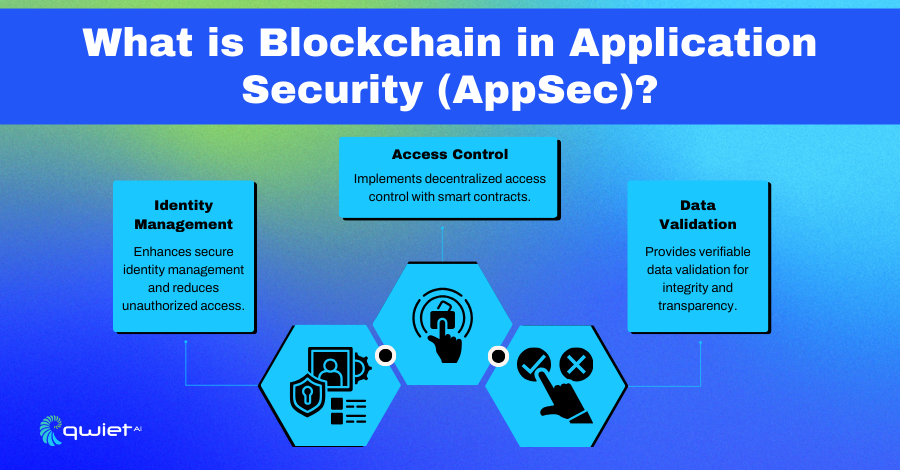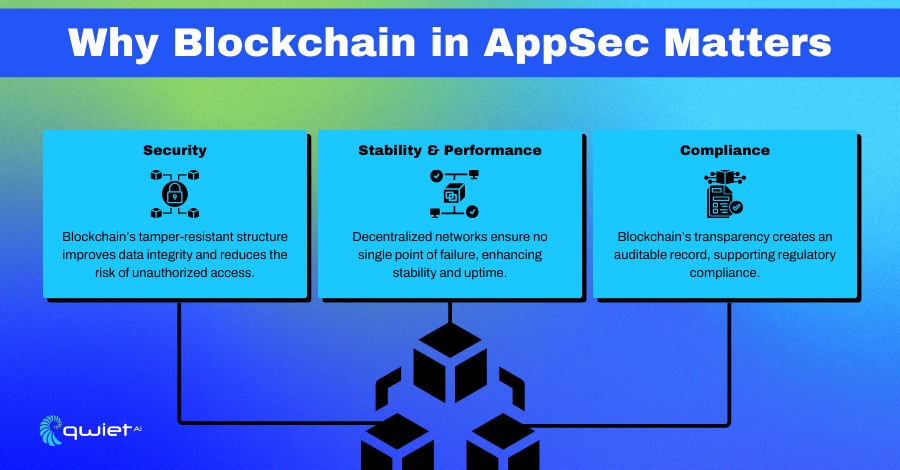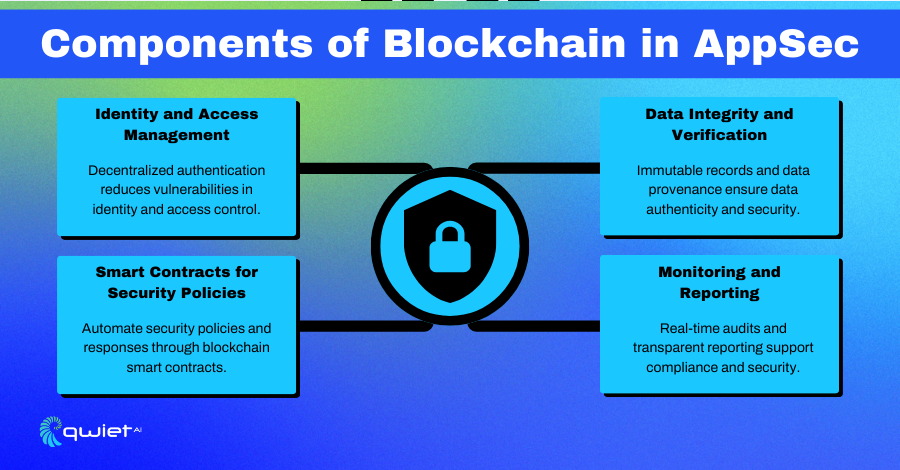What is Blockchain in Application Security (AppSec)?

Blockchain in Application Security (AppSec) involves using blockchain technology to enhance application security. Blockchain’s decentralized and unchangeable ledger provides unique benefits for securing applications, offering higher data integrity and transparency than traditional methods. In AppSec, blockchain technology adds a layer of protection, helping prevent unauthorized modifications and ensuring that records remain accurate and trustworthy.
Role in Application Security
Blockchain contributes to various security aspects within applications, particularly in secure identity management, access control, and data validation. With its distributed nature, blockchain supports decentralized authentication methods, making it less vulnerable to central points of failure. Blockchain-based access control can also provide clear, enforceable rules for who can perform specific actions within an application. This approach aids in maintaining a high level of trust and accountability, allowing organizations to protect sensitive data and minimize unauthorized access.
Integrating blockchain into AppSec aims to enhance protections against unauthorized access, fraud, and data tampering across application environments. By leveraging blockchain’s characteristics, applications can become more resilient to external threats and tampering, supporting a security framework that keeps data accurate, interactions transparent, and user authentication trustworthy.
Why Blockchain in AppSec Matters

Security
Blockchain’s distributed and tamper-resistant structure makes altering data extremely challenging, significantly strengthening data integrity and reducing the chances of data breaches. Once added to the blockchain, each record is locked into place, making unauthorized modifications highly improbable. This characteristic is invaluable for applications where data accuracy and trustworthiness are paramount.
In identity and access management, blockchain enables more secure systems by decentralizing authentication. This minimizes risks from unauthorized access and boosts trust in the overall authentication framework. Blockchain-based identity systems allow organizations to create immutable and decentralized identity records that are hard to tamper with, enhancing user security and privacy.
With blockchain, organizations gain an additional layer of defense against cyberattacks. By reducing the attack surface and supporting secure, verifiable transactions, blockchain in AppSec fortifies applications against unauthorized activities. Each transaction or access attempt is verified, offering a clear, secure path that is much harder to exploit.
Stability & Performance
The decentralized nature of blockchain promotes stability by removing single points of failure, which is particularly beneficial for applications where continuous operation is non-negotiable. In a blockchain-based setup, stability is enhanced since no single server or component has control, making the system resilient to isolated outages or disruptions.
Blockchain also decreases reliance on centralized servers, which often face load balancing and uptime limitations. With blockchain, data, and processes are distributed across multiple nodes, resulting in more consistent performance and lower downtime in many cases. This consistency can be crucial for applications that require dependable access and uninterrupted service.
Compliance
For industries that deal with sensitive or regulated data, blockchain’s ability to create verifiable audit trails becomes a significant advantage. Blockchain naturally aligns with compliance requirements such as GDPR, HIPAA, and PCI-DSS by offering an immutable and transparent record of data transactions. These secure records are readily available for auditing and streamlining compliance.
Blockchain’s transparency and immutability support regulatory goals for data protection and accountability. This makes it easier for organizations to meet audit standards and stay compliant without building custom tracking solutions. With blockchain, applications can meet compliance needs more seamlessly, reducing the risk of regulatory penalties and the resources required for ongoing compliance.
Components of Blockchain in AppSec

Identity and Access Management (IAM)
Decentralized Authentication
Blockchain introduces a decentralized method for managing identities, a strong alternative to traditional, centralized authentication systems. In a decentralized setup, blockchain distributes identity data across multiple nodes, making it far less vulnerable to single points of failure or targeted attacks. This decentralization strengthens the authentication process, helping to protect user information and reduce the risk of unauthorized access.
Access Control:
Blockchain can enforce access policies automatically through smart contracts. Smart contracts act as pre-set rules that allow only authorized users to access specific parts of an application. This approach allows applications to restrict actions to defined user groups, making access control both more secure and efficient. With blockchain, these access policies are enforced consistently, supporting a secure and trustable access structure.
Data Integrity and Verification
Immutable Records
Blockchain’s structure creates an unchangeable, or immutable, ledger where data, once recorded, cannot be modified or deleted. This feature is valuable for any application requiring a reliable data integrity foundation. By storing immutable data, blockchain preserves records’ accuracy, making them trustworthy and tamper-resistant.
Proof of Provenance:
Blockchain also provides a reliable way to verify the source and history of data, known as proof of provenance. This feature confirms that data has not been altered and helps verify its origin, ensuring that only genuine data is used within the application. This verification level is particularly useful in cases where data authenticity is critical, such as in supply chain tracking or digital content verification.
Smart Contracts for Security Policies
Automated Security Rules
Smart contracts enable the automatic enforcement of security policies, including access permissions and data handling protocols. Once security rules are set within a smart contract, they execute without human intervention, reducing the risk of human error and enforcing a consistent application of security standards. This automation enhances the reliability of security policies, as these rules will execute exactly as intended each time they are triggered.
Incident Response
In a security incident, smart contracts can initiate automatic responses, such as blocking unauthorized access or creating security logs of critical events. These automated responses allow for faster mitigation of threats and provide a reliable record of events during an incident. This capability helps applications respond to threats in real-time, reducing potential damage and supporting rapid recovery.
Monitoring and Reporting
Continuous Security Audits
Blockchain’s transparent ledger offers a real-time, continuously updated view of security events across an application’s lifecycle. This allows security teams to conduct ongoing audits and observe how security policies perform over time. With blockchain, each event is recorded in a way that is accessible and tamper-proof, creating a reliable and up-to-date source of information for security assessments.
Comprehensive Reporting
Blockchain’s transparency simplifies compliance reporting, as all transactions, changes, and access events are easily available in the ledger. This structure supports clear and comprehensive reports, helping organizations demonstrate compliance with data protection standards. Whether for internal oversight or regulatory requirements, blockchain’s detailed record-keeping makes it easier to compile accurate reports without additional tracking efforts.
Conclusion
Integrating blockchain into application security (AppSec) brings valuable enhancements for safeguarding applications, strengthening data integrity, and supporting regulatory compliance. With its decentralized structure, blockchain adds resilience to identity and access management (IAM), while smart contracts automate and secure access control and incident response. The immutable blockchain ledger ensures data authenticity and enables real-time security monitoring and reporting, making compliance more seamless. Blockchain offers significant security advantages, especially for applications where data integrity, access control, and audibility are priorities. Book a call with the Qwiet AI team today to discover how we can help secure your application security.
Read Next
No related posts.
About Qwiet AI
Qwiet AI empowers developers and AppSec teams to dramatically reduce risk by quickly finding and fixing the vulnerabilities most likely to reach their applications and ignoring reported vulnerabilities that pose little risk. Industry-leading accuracy allows developers to focus on security fixes that matter and improve code velocity while enabling AppSec engineers to shift security left.
A unified code security platform, Qwiet AI scans for attack context across custom code, APIs, OSS, containers, internal microservices, and first-party business logic by combining results of the company’s and Intelligent Software Composition Analysis (SCA). Using its unique graph database that combines code attributes and analyzes actual attack paths based on real application architecture, Qwiet AI then provides detailed guidance on risk remediation within existing development workflows and tooling. Teams that use Qwiet AI ship more secure code, faster. Backed by SYN Ventures, Bain Capital Ventures, Blackstone, Mayfield, Thomvest Ventures, and SineWave Ventures, Qwiet AI is based in Santa Clara, California. For information, visit: https://qwietdev.wpengine.com
